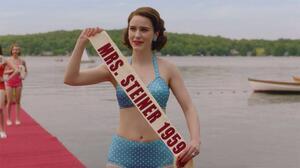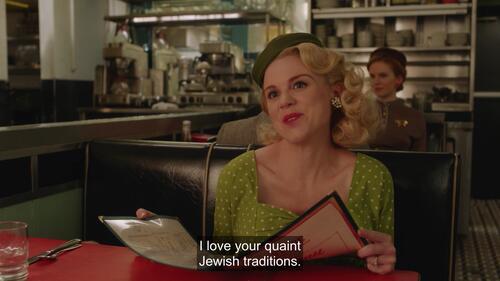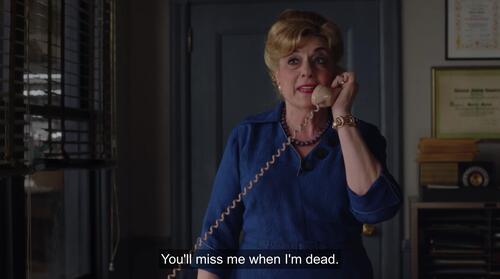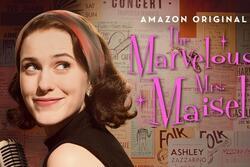Review: “Mrs. Maisel” Season 2
Spoilers ahead.
I have been struggling to write about the second season of Amazon’s The Marvelous Mrs. Maisel because my opinions are continually shifting, contradicting each other and leaving me confused about my own impressions of the direction the show is taking. Circumstance is as important to the consumption of media as frame of mind while watching (or reading, or listening). This time last year, I was exhausted to my core—by political theater, by trying to make ends meet, by the physical distance between my long-term partner and me. Maisel splashed onto my television screen when I needed to tune out and lose myself entirely in impeccably-designed sets and eye-popping colors. Never much one for binging television, I finished the entire first season in a week. And I spread the word—within weeks, my parents, my partner’s parents, and most of my friend group had indulged, and we lamented having to wait another year to see where Midge had ended up after her successful closing set at the Gaslight Café in season one.
I gathered with a group on the fourth night of Hanukkah in December to stream the first few episodes of season two. Expectations were high. But the opening whirlwind (Midge and her parents find themselves in Paris) left a bitter taste in my mouth—partly because it makes little sense, plot-wise, but also because it is predicated on Midge successfully delivering a comedy routine to a French-speaking audience. I understand that improbability is part of fantasy. I just wished the marvelous-ness of Miriam Maisel was not a given. Everywhere she goes—from the Village to Paris to Philadelphia, she is (mostly) showered in accolades. I realized, as hours of watching time elapsed, that I wanted her to really fight for something.
Part of the elaborate fantasy of the Maisel universe is the titular character’s socioeconomic position and ability to utterly neglect typical responsibilities in favor of her own pursuits. Her children are afterthoughts, her marriage (while ruptured) still involves her ex-husband wholeheartedly supporting her brilliance, and her wealth is limitless. Her major hurdle is her gender, but even that doesn’t really present a challenge. She lives with her parents in their Upper West Side classic six apartment, sojourns for two months to the Catskills (all expenses paid), and rarely repeats an outfit. These details lend themselves to lush backdrops, but don’t make much sense in terms of plot progression.
And then there’s the question of her Jewishness. Even as I laughed to the point of tears at the Yom Kippur-centric episode this season, I couldn’t shake my lingering discomfort. I felt like I was watching an elaborate, goyishe caricature of Jewish life. Little details irritated me—like that Midge shops at a butcher that also sells pork chops (I have a hard time believing that she wouldn’t have a kosher butcher on standby in 1959), and that neither Midge nor her parents are played by Jewish actors.
These aren’t deal breakers for my viewership, but they do give me pause. If Maisel is going to serve as many people’s introductions to Jewish life in New York City in the mid-century, it’s hardly representative of the typical experience. There was a part of me that expected Midge to be thrown out of her parents’ house at some point this season, having to figure out her own finances, her own living situation, and perhaps her own cultural and religious relationship to Judaism. If she wasn’t partaking in a break-fast catered by her family’s maid, would Yom Kippur remain part of her schtick?
I bristled, too, at the characterizations of the Weismann and Maisel parents. Midge’s parents are neurotic (her father is one perceived family tragedy away from dying out of pure spite), while Joel’s parents exemplify every possible stereotype of greedy Jews in business. There is rarely a subplot with these two characters that doesn’t involve scamming either their workers or fellow mahjong players out of cash.
Now the high points: I have an unending love for Susie Meyerson, Midge’s foul-mouthed manager, in every scene she’s in. The soundtrack is perfect. I was truly appreciative of every single shot of delicatessen lunches —and took to eating a pickle as a snack while watching. I enjoyed Midge’s filthy wedding speech given at her friend’s conservative Catholic ceremony and reception far more than I should have. Midge and Susie together bring an electric energy to the screen that reminds me why I watch the show in the first place.
Overall, this season swung from delightful highs to head-scratching lows, culminating in Midge’s decision to return to her ex-husband Joel for one night before embarking on a six-month comedy tour. She tells him that she’s going to be alone for the rest of her life because of the path she’s chosen, and wants to spend one last evening in the arms of someone who really loves her. This ending left me feeling utterly cold, and baffled. This season of Maisel takes great pains to introduce a new love interest for Midge—Benjamin—-who not only knows about Midge’s career in comedy, but also wholeheartedly supports it. He is even preparing to propose in the final episode before Midge is invited to go on tour. We never see her breaking this news to him, or explaining her fears and doubts before deciding their relationship is over. I’m not of the belief that a woman needs a man—but the show spends a lot of time on both Joel and Benjamin’s plotlines, only to throw them out of the window in the final moments of season two.
I am hopeful that the next season will keep the focus on Midge and Susie’s relationship and drop pretenses about the importance of the men that orbit them. I am skeptical of Maisel’s ability to redeem the stacked Jewish stereotyping that has permeated this past season, as the characters are well-established at this point. I want to see Midge independent of her family’s wealth and privileged upbringing, elbow-deep in her work, unsure of where she’s going next, but pressing forward because she believes her talent is real. And perhaps, she’ll even find the time to locate a good kosher butcher.










Not an accurate review. Golden Globe winners don't aren't given for poor performances. Humor and Witt in Paladeno-Sherman's writing. Doubt you could do a better job.
I disagree, especially about the kosher butcher - my grandparents' Jewish club has been serving pork and shrimp for years. The Weissman apartment is on the Upper West Side (paid for by Columbia) and as an UWS Jew myself whose family secularized earlier than the time that Mrs. Maisel takes place the show resonates with me SO strongly, I feel like I'm at home while I'm watching and I love it for that. It may not tell every Jews story but I feel it tells mine.
I disagree with the comment regarding Joel's father: unless I misunderstood the episode, he values his employees to the extent of keeping their worthless spouses on payroll to keep them.
I am right with you on my feelings here. I devoured the first season like a whole box of cookies, and the second season, while I wanted to like it, just left me feeling less enthused, and I watched more out of a sense of duty than excitement. As pretty as it all is, I think I was ready for a little more depth and development than I ended up getting, and too many loose ends and baffling twists for me.